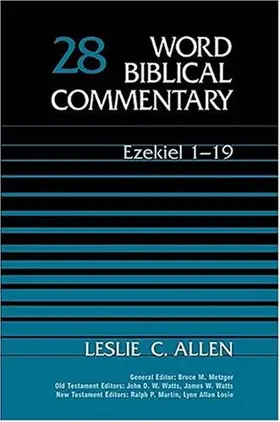

Ezekiel 1–19
Pages
420
Publisher
Thomas Nelson
Published
1/1/1994
ISBN-13
9780849908309
Reviews
Dallas: Word Books, 1994. Pp. xxxvi + 306, Hardcover, $28.99, ISBN 0849908302. Daniel I. Block Southern Baptist Theological Seminary Louisville, KY 40280 Allen's commentary continues the fine tradition of scholarship known from previous works in the Word Biblical Commentary series. This volume replaces the commentary in this series with the same title by W. H. Brownlee (1986). Although the editors are to be commended for publishing the earlier work posthumously, its incompleteness and some of the author's idiosyncratic interpretations prevented it from gaining wide acceptance with scholars. The editors of the series are also to be commended for commissioning Allen to write his own commentary on the first nineteen chapters of the book. Not only had he already had a hand in the earlier volume, having filled in the textual notes for the first sixteen chapters after Brownlee's untimely death, his commentary on chapters 20-48 (Volume 29 in this series) is a masterpiece. Readers will welcome this new volume because it continues Allen's high standards of scholarship and perceptive insights. The commentary opens with a brief introduction to the book (which supplements his introduction to Volume 29), in which Allen sets forth his agenda and his method. Identifying himself as a moderate conservative, Allen claims a middle course between the historical-critical and form-critical methodology of Walther Zimmerli and the sensitive literary analysis of Moshe Greenberg. Accordingly, he is much more generous than the former in what he attributes to the prophet, but slightly less generous than the latter. Allen proposes that the present form of many of the prophecies is the product of a staged evolution. In general, in the earliest stage the prophet received a word from Yahweh and passed it on to the people. At a later time the prophet himself may well have committed many of his prophecies to writing, adding further commentary and modifying the style so that what faces the reader is a literary piece rather than a transcript of an oral pronouncement. Allen allows for considerable input from later editors, whom he refers to as Ezekiel's disciples. However, he argues for a relatively short time between Ezekiel's own prophetic ministry and the completion of the book of Ezekiel. In fact, these redactors appear to have known Ezekiel intimately, and with great literary skill they updated the prophet's work for the generation that followed him.
[Full Review]
